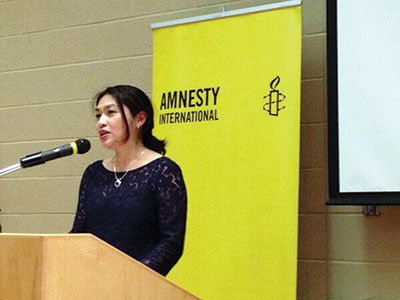Mellissa Fung speaks at MRU
People in Afghanistan just want a normal life, says Fung
Jeff Kobar
Staff Writer

Mellissa Fung reporting on the political and economic struggle in Afghanistan since 2008, came to MRU to talk to students about her experiences.
Photo courtesy: Twitter
Mellissa Fung, a Canadian journalist, experienced the conflicts in Afghanistan first-hand when she dedicated herself to covering the issue.
Reporting out of a base camp alongside the New York Times and CNN, Fung has been one of Canada’s only reporters still covering the political and economic struggle in Afghanistan since 2008. Even after Canadian troops pulled out in 2011, she still continues to visit and cover stories of the nation’s progress.
Fung spoke to journalists, students and spectators alike Nov. 12 at Moot Court about her decision to return to Afghanistan after being kidnapped and held hostage for 28 days on her way to a refugee centre. She spoke about her book Under The Afghan Sky and about the need to break stereotypes and for Canadians to understand that Afghanis just want to have a normal life too.
The Reflector: Why go back to Afghanistan?
Mellissa Fung: I don’t have a good answer. I will quote Captain Trevor Green (a Captain in Kandahar province, who had made relations with the villagers),”When your blood has stained the Afghan sand, you can never truly walk away.”
TR: What precautions do you take when you go to Afghanistan?
MF: I was first a CBC employee; I was subject to their security requirements. I stayed in a secure compound at the New York Times house and I made arrangements with a security firm to have an Afghan driver and I had a GPS on me.
TR: Would you change your career?
MF: I’ll use a hockey analogy, if you know you’re going into the corner and could get hurt you still do it. It’s your job! You must be very aware; it stays in the back of your head, but you can’t let that stop you.
TR: What is you opinion on how media is represented in Afghanistan?
MF: Stories on a whole look negative. Some stories are not covered honestly. We got in a debate with the male reports and I said they were not talking to women. They’re not talking to girl students or female politicians. You know 80 per cent of women are still illiterate in that country and it gets worse when you leave Kabul. Development is slow though.
TR: How are women represented in politics?
MF: The number of women in Afghan parliament is over 30 per cent of the seats, that’s higher than Canada. Last election a woman was running for vice-presidency, but there’s still a long way to go.
TR: How are women being treated in Afghanistan?
MF: 80 per cent of all Afghan women have been subject to some sort of violence. Many girls are still married off below the legal age of marriage, which is 16. There are shelters provided in 10 of the 12 provinces, many of which did not exist 20 years ago. Afghanistan has also recently added women in the police force. The current president is committed to improving women’s rights, as well.
TR: What are men’s thoughts on women’s rights and education?
MF: The majority of men do recognize that women’s education is an important role in going forward. An overwhelming number like 67 or 70 per cent I believe.
TR: What are the conditions of schools?
MF: A man named Aziz (a teacher) had problems with teaching people about democracies, humanism and having a co-ed school. His school has a 100 per cent graduate rate with teaching women in their early years up to their late 20s.
TR: What are hospital conditions like?
MF: Dr. Wazi works at a state of the art pediatric centre in Kabul, which France had also put money into. You wouldn’t believe that it’s in Afghanistan, childbirth mortality rates have decreased significantly in the last 10 years. Wazi is 28, one of 80 residents who is expected to graduate in the next four years. His boss is a woman, a cardiologist.
TR: What did you want right when you were released?
MF: A cheeseburger and a bottle of scotch.
TR: What is your final thought on Afghanistan?
MF: Afghans needs to take control of their own country, their own destiny. They still need our support. But Canada has expertise when it comes to the economy, resource centre and growing the economy. There is hope.
TR: What can we do to help?
MF: Support or check out Canadian Women for Women in Afghanistan. (http://www.cw4wafghan.ca)




